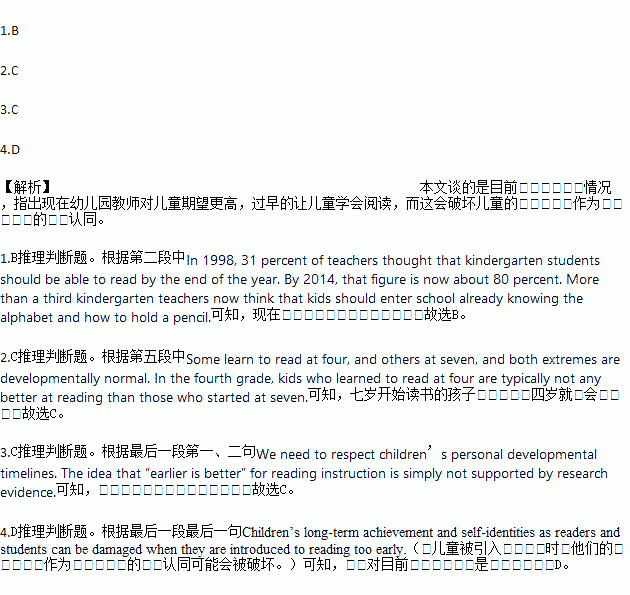题目内容
Kindergarten—which means “garden for children” in German—is not kindergarten any more. It’s yesterday’s first grade, or even second.
A 2014 study compared kindergarten teachers’ expectations for their students in 1998 to today. The differences were striking. In 1998, 31 percent of teachers thought that kindergarten students should be able to read by the end of the year. By 2014, that figure is now about 80 percent. More than a third kindergarten teachers now think that kids should enter school already knowing the alphabet and how to hold a pencil.
Besides, the researchers found huge decreases in the amount of self-directed, creative play time—dress up, art, sand and water play—and increases in the amount of time students were involved in teacher-directed, whole-class instruction.
Unfortunately, kindergarten today ignores a basic fact of young children’s development that is well-known by early childhood educators: normal development in young children occurs at very different rates and in very different ways. For example, the average age that a baby starts to walk is 12 months, but some kids start walking at eight or nine months and others at 15, or even 16, months.
Similarly, the average age that a child learns to be an independent reader is about six and a half. Some learn to read at four, and others at seven, and both extremes are developmentally normal. In the fourth grade, kids who learned to read at four are typically not any better at reading than those who started at seven. Countries like Finland and Sweden do not even start formal academic schooling until age seven.
We need to respect children’s personal developmental timelines. The idea that “earlier is better” for reading instruction is simply not supported by research evidence. Children’s long-term achievement and self-identities as readers and students can be damaged when they are introduced to reading too early.
1.What can we infer from the text?
A. Kindergarten has been replaced by first or even second grade.
B. Kindergarten teachers have higher expectations for students now.
C. Kindergarten students’ intelligence has been largely improved.
D. Children should know the alphabet before entering kindergarten.
2.What will probably happen to children who learn to read at 7?
A. They will perform best among their classmates.
B. They will have difficulty becoming an independent reader.
C. They will catch up with those who learn to read earlier.
D. They will fall behind those who learn to read earlier forever.
3.What should kindergarten teachers do according to the text?
A. Increase the time in whole-class instruction.
B. Pay more attention to children’s academic level.
C. Encourage children to learn at their own pace.
D. Raise children’s competitive spirit at an early age.
4.How does the author feel about the present education in kindergarten?
A. Ashamed. B. Cautious. C. Satisfied. D. Concerned.

